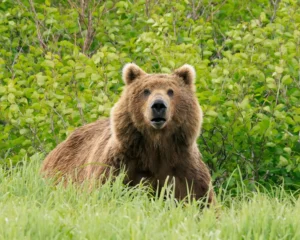NO ON PROPOSAL 75
Every year, Alaska’s Board of Game considers dozens of proposals to modify regulations surrounding the management and hunting of animals in Alaska. Some of the proposals are submitted by individuals, others by hunting groups, and at times, by the Alaska Department of Fish and Game itself. You can learn more about the process here.
Alaska Department of Fish & Game has submitted Proposal #75, which would authorize aerial helicopter hunting of wolves and bears by ADFG staff. Here’s the text of Proposal 75:
Full Text of Proposal 75
If you’d like to submit your own comments, please visit this link:
Submit Comments on Proposal 75
You have until 11:59 PM on 12/27/24 to submit your comments regarding Proposal 75 and any of the other 84 proposals. Make sure to check the bubble “Oppose” on Proposal 75 on that page, too, so it gets included.
Here is the comment I submitted if you’d like an idea of what to say.
I am writing to express my strong opposition to Proposal 75, which seeks to authorize the hunting of bears and wolves from helicopters to protect moose populations in Unit 16. While I understand the desire to manage wildlife populations in a way that supports moose populations, this method of hunting is neither ethical nor sustainable, nor is it fiscally sound. Using helicopters to kill predators from the air disrupts the delicate balance of Alaska’s ecosystems and sets a dangerous precedent for wildlife management.
First and foremost, from a purely fiscal standpoint, the proposal is a waste of valuable taxpayer resources. ADFG itself recognizes that “adoption of this proposal would result in significant costs to the department if department staff conduct control activities.” By ADFG’s own reporting on similar intensive management efforts to protect the Mulchatna caribou herd in 2024, “overlapping confidence intervals across these years suggest that the population could have been anywhere on the spectrum of values, and in fact could have been declining instead of growing. The harvest objective of 2,400–8,000 has not been met due to the close of the seasons for continued conservation concerns as the MCH has shown no appreciable population increase since at least 2017.”
Basic principles of good stewardship of public funds require some evidence of return on investment, and if ADFG cannot credibly say that the IM activities have evidenced a modicum of success in other units, Proposal 75 is essentially placing hundreds of thousands of tax dollars on red or black on a roulette wheel, hoping for the best. Taxpayers deserve better.
Furthermore, hunting from helicopters introduces a significant ethical concern. It is a method of hunting that is neither fair nor humane. The aerial approach eliminates the possibility for the animals to flee or defend themselves, essentially rendering it a one-sided slaughter. This approach is at odds with the principles of ethical hunting, which emphasizes fair chase and respect for the natural behaviors of wildlife. It is vital that wildlife management efforts reflect our collective responsibility to treat animals with dignity and compassion, not as targets in an unfair and distressing manner. While I recognize that under Proposal 75, ADFG is proposing initially only to conduct IM activities on wolves, the statement by ADFG that “The department has no plans to activate bear control at this time” rings hollow. Proposal 75 would allow the department to flip a switch and begin IM activities on bears at a moment’s notice without any scientific data to support such efforts.
Moreover, the impact of this practice on the broader ecosystem is cause for concern. Bears and wolves play an essential role in maintaining the health and stability of Alaska’s ecosystems. As apex predators, they help regulate populations of other species and prevent overgrazing that could negatively affect vegetation. The removal of these predators from the landscape could result in unforeseen ecological consequences, potentially harming the very moose populations that the proposal intends to protect. It is important to consider the long-term consequences of such a drastic action, which could alter the natural order and have cascading effects on other wildlife.
Furthermore, the proposal fails to consider non-lethal alternatives for managing predator populations. Scientific research has demonstrated that there are more humane and effective ways to support moose populations, such as habitat restoration, addressing human-related disturbances, and implementing targeted, localized management practices. This is to say nothing of focusing on poaching, which is not at all discussed in connection with Proposal 75. By ADFG’s own reporting on IM activities in 2024 regarding authorized hunting of the Multchatna caribou herd, “We suspect the actual harvest is substantially higher than the reported harvest.” But the reality is, ADFG has no firm data to indicate that either bears or wolves are the primary contributors to perceived declines in moose populations in Unit 16. By prioritizing non-lethal methods, we can promote a more balanced and sustainable approach to conservation, one that respects the integrity of the entire ecosystem while also considering the welfare of all species involved.
In conclusion, I urge the Alaska Board of Game to reject Proposal 75 and consider more ethical, and fiscally and ecologically sound methods for protecting moose populations. The use of helicopters to hunt bears and wolves is not only inhumane but also poses a serious risk to Alaska’s natural environment. It is also fiscally unsound. We have a duty to protect all species, including apex predators, in a way that is both responsible and respectful. I respectfully ask that you reconsider this proposal and focus on more sustainable and humane wildlife management practices for the benefit of both the moose and Alaska’s broader ecosystem.


